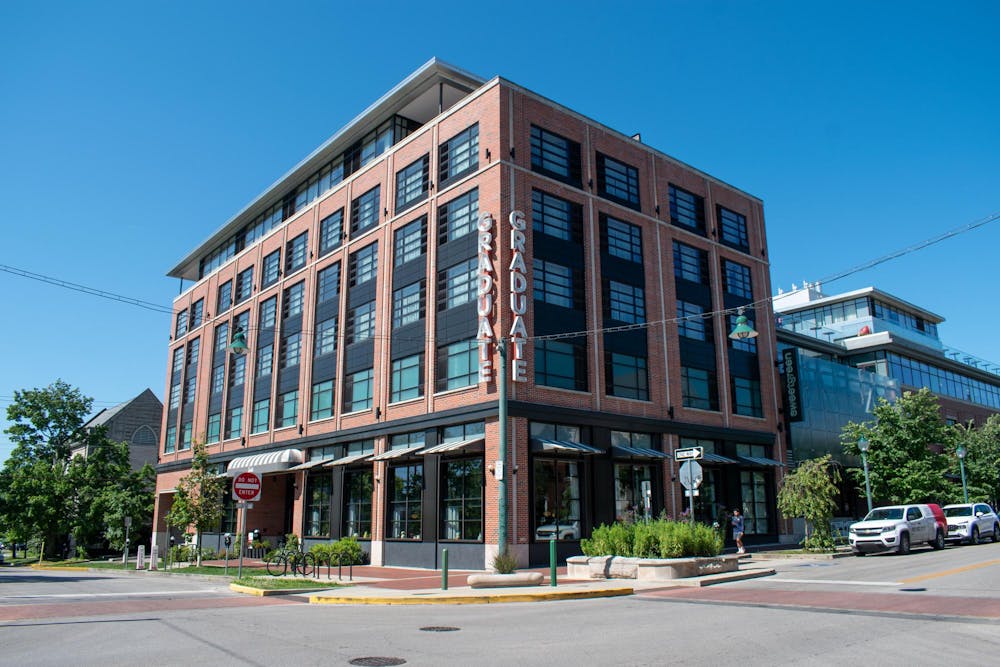In an effort to be able to sell alcohol, the Graduate Hotel Bloomington has applied to be considered a historic building, with the possibility of creating a historic district that the hotel would reside in. The attempt was met with skepticism from members of the Bloomington Historic Preservation Commission due to the hotel being built only six years ago.
If designated as part of a historic district, The Graduate would be able to have an alcoholic beverage permit, something that has been denied to them thus far due to its proximity to First United Methodist Church. The law in Indiana, Indiana Code 7.1-3-21-11 states that if a premises wishes to obtain a permit to sell alcohol, it “may not issue a permit for a premises if a wall of the premises is situated within two hundred (200) feet from a wall of a school or a church.” The First United Methodist Church could not reach a consensus giving consent to the Graduate Bloomington.
Although the main goal of the Kirkwood Avenue hotel is to receive permission to sell alcohol and use liquor as a selling point for guests and event bookings, the hotel presented their argument as a request that would benefit the other buildings in the surrounding area. Representatives from the hotel suggested having an entire historic district for other buildings on Kirkwood Avenue, citing the need to protect the history of the street.
The Bloomington Historic Preservation Commission met July 11 with hotel representatives Alex Intermill of Bose McKinney & Evans Law Firm and Pablo David of AJ Capital, the company that owns The Graduate Hotel Bloomington.
As stated by Bloomington’s Historic Preservation Board of Review, a historic district is defined as being at least 50 years old. When considering an area for historical designation, the reviewers from the commission consider how historic and architecturally worthy a property is. These nine members are appointed by the mayor.
In the meeting, Intermill said it is stated on the Board of Review’s website that the building “should” be 50 years old, not that it must be. The Graduate Bloomington is only six years old but is making its claim for historic preservation due to its “commitment to history” and the “economic benefit” for the Graduate Hotel, according to Intermill.
According to Intermill, the hotel loses on average 25 event bookings per year because they cannot serve alcohol. He said this not only stunts revenue for The Graduate, but for the city.
The Graduate officials also argued it’s worthy of the historic building designation because the interior design of the hotel preserves history. Some examples of the hotel’s homages to the history of Bloomington and Indiana University are design choices such as bleachers restored from local high schools installed in the lobby, displays of Hoagy Carmichael’s, bloomington native and IU graduate, sheet music and a mural of the 1952-53 IU men’s basketball team.
During the meeting, one commission member said he was “kind of okay” with the idea of making Kirkwood a historic district.
“I like the idea of what was mentioned about maybe some of the other owners might be enticed to help protect Kirkwood,” commission member Daniel Schlegel said.
None of the other commission members were in favor of The Graduate receiving historic designation.
“As far as the streetscape goes, I think that would put a significant burden on a lot of the other individuals along the street because as soon as it would be classified as a historic building, their cost to maintain those buildings probably goes up significantly,” commission member William Fulk said. “So, I don’t see that as a viable option either.”
Following The Graduate’s presentation of their request for historical designation, commission member Reynard Cross asked David if he “legitimately” believed that The Graduate Hotel was worthy of belonging in a historic district on its own merits, or if it was only a “backdoor” method of obtaining a liquor license. David said it is both, describing the hotel as a museum of sorts.
“My understanding of our purpose here is to protect the building on its own merit,” Cross said. “I don't necessarily see how we are obligated in any way to consider any issue other than that.”
He recommended using The Graduate’s economic concerns as reason to request variance to the ordinance preventing them from selling alcohol.
“I think the most kind I can be is to describe this as disingenuous and for you to seek to gain the approval of this organization is offensive, insulting,” Cross said. “Let’s leave it at that. Secondly, I am yet to see in your presentation any justification for protection of this building as a historic building.”
Commission member Sam DeSollar said he likes the building itself, but that he found the hotel’s representatives’ arguments “both disingenuous, bordering on specious,” and that he thinks “this is an hour we would all like to have back.”
“We can’t consider a liquor license, it’s not our purview,” commission advisory member Jeremy Hackerd said.
The commission now waits for The Graduate to schedule a meeting for the vote. The next available meeting is Aug. 22. The commission’s meetings take place on the second and fourth Thursdays of the month.




